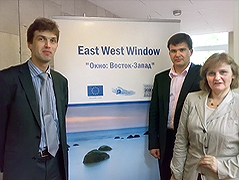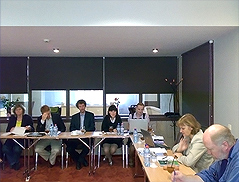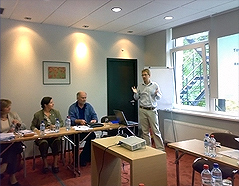Working Package 2
Working Group on accessibility and development zones
The outcome of the work contains both a long term vision and concrete implementation proposals aimed to raise competitiveness of the Baltic Sea Region and its territorial cohesion. The Working Group 2 (WG2) concentrated on national, cross-border and transnational strategies, obstacles for co-operation, real and feasible accessibility perspectives as well as development clusters and zones. WG2 thematic scope for the accessibility included not only hard infrastructure issues but also soft measures and was extended by the issues related with technological networks.
WG2 explored technical, organizational and political options for better internal and external accessibility of NW Russia, especially in the fields of (a) international freight transport (rail / shipping / pipelines), (b) passenger transport (rail / aviation), and (c) information + communication technologies (ICT).
The WG2 had three distinct types of activities, and each of them yielded respective outputs:
The leading country of the WG2 was Finland with Latvia as a co-chair of the Group. Senior civil servants from Germany, Sweden, Poland, Latvia and Lithuania took part at the meetings as well as experts delegated and financed by VASAB countries or the project.
Working Group on accessibility and development zones
The outcome of the work contains both a long term vision and concrete implementation proposals aimed to raise competitiveness of the Baltic Sea Region and its territorial cohesion. The Working Group 2 (WG2) concentrated on national, cross-border and transnational strategies, obstacles for co-operation, real and feasible accessibility perspectives as well as development clusters and zones. WG2 thematic scope for the accessibility included not only hard infrastructure issues but also soft measures and was extended by the issues related with technological networks.
WG2 explored technical, organizational and political options for better internal and external accessibility of NW Russia, especially in the fields of (a) international freight transport (rail / shipping / pipelines), (b) passenger transport (rail / aviation), and (c) information + communication technologies (ICT).
The WG2 had three distinct types of activities, and each of them yielded respective outputs:
- The present situation, development trends and political objectives in the fields described above as well as their territorial consequences for regional development and settlement structure were explored ("overview").
- Recommendations to improve the situation from the viewpoint of economic and territorial integration of the BSR were formulated ("recommendation paper").
- Fields for further concrete actions were identified and concrete measures were suggested for implementation ("action plan with pilot investments").
The leading country of the WG2 was Finland with Latvia as a co-chair of the Group. Senior civil servants from Germany, Sweden, Poland, Latvia and Lithuania took part at the meetings as well as experts delegated and financed by VASAB countries or the project.


